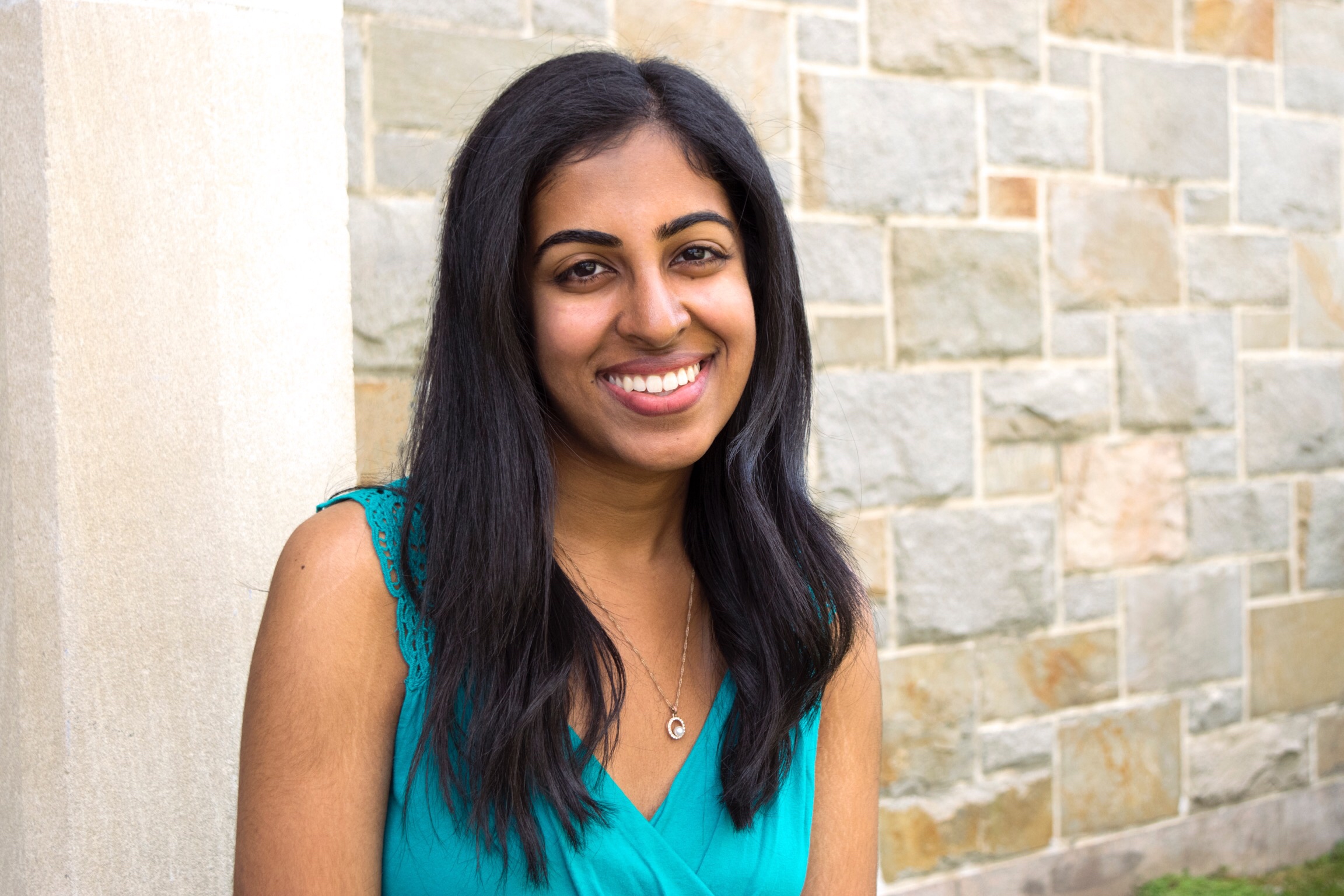Miriam George starts every day at around 6:30 a.m. by going to the library to study until her classes begin. From there, her schedule is pretty routine: eating lunch with friends, taking a trip to the gym, having dinner with friends and then doing homework or more studying. George is a senior at Boston College and has her eyes set on law school after she graduates, specifically employment law, where her passion for fighting discrimination is at its greatest.
Growing up, George admits she was pretty privileged for a woman of color, but that privilege still didn’t stop people from noticing her race or commenting on it. “I lived a very comfortable life, my parents provided everything for us, which was great,” George says. “But growing up in a predominantly white town, I definitely noticed my race from an early age and people pointed it out as well.”
Racial comments towards her and her parents have fueled George’s passion for fighting discrimination. “Knowing what that feels like has made me want to prevent other people from having to suffer discrimination and racially charged incidents like that,” she says.
Starting from her first internship at the Massachusetts Commission Against Discrimination (MCAD), George’s focus has always been about helping people dealing with discrimination. “Mainly my job with them was to travel around Massachusetts and give outreach presentations to marginalized groups of people,” George says. These marginalized groups ranged from racial and religious organizations to disability commissions.
“My freshman and sophomore years I didn’t really fully understand how interested I was in employment, and when I’d actually worked on employment discrimination cases both those years through those agencies is when I decided ‘Oh, this is what I’m actually interested in’.”
These presentations would explain the different types of discrimination there are, their rights under Massachusetts state law and how the MCAD could help them. “Ultimately, I brought a lot of people who had faced discrimination into the office to file legal complaints which the MCAD was then able to resolve.”
Her second internship at the Civil Rights Division of the Massachusetts Attorney General’s Office was more hands-on, with George staying in the office to help those who came to her with discrimination complaints by getting all their information and then facilitating negotiation for restitution between the person doing the discriminating and the person being discriminated against. “I think I worked on a hundred and twenty or so cases while I was there and was able to resolve those,” she says. “And if the attorney general’s office decided to take up any of them and litigate them, then I helped my boss with those court cases.”
While George’s overall passion has always been fighting discrimination, it was those two internships that helped her identify a central focus of employment discrimination that she’s extremely passionate about. “My freshman and sophomore years I didn’t really fully understand how interested I was in employment, and when I’d actually worked on employment discrimination cases both those years through those agencies is when I decided ‘Oh, this is what I’m actually interested in’,” she says.
Her third internship, and in her words “the coolest,” was working in the Department of Labor in the Office of the Assistant Secretary for Policy in Washington, DC. George worked on a month-long project about artificial intelligence, the future of the labor market and preparing workers, which she was able to then present to the Secretary of Labor. “I felt like it was just so high up and I really felt like I was making an impact,” George says.
“It’s so rewarding to see kids get excited about government and making a change.”
Beyond her work in fighting discrimination, George is a part of Generation Citizen, a national non-profit that works to bring civics education to schools. As part of Generation Citizen, the Boston College chapter goes in twice a week to teach high school students about government and advocacy, which from there the high schools students will chose an issue that they’re passionate about in their communities to solve, using what they’ve been taught.
Involved since her freshman year, George serves as the president of Boston College’s chapter of Generation Citizen, a position she rose to from formerly being the outreach director and the vice president in her sophomore and junior year.
With George teaching through Generation Citizen, her students this past spring decided the issue they wanted to solve was racially motivated traffic stops by Boston Police. They met with three Massachusetts senators and representatives to lobby for a bill to tackle this issue. In doing so, they received legislative response with a bill, No. 1575, which is currently undergoing a study with the hope that the legislature will pass it soon.
While she isn’t teaching students this semester due to law school applications, George can’t wait to go back. “I’m hoping to go back to the classroom next semester,” she says. “It’s so rewarding to see kids get excited about government and making a change. When they realize that they have power, it’s an amazing thing to see because they’re so excited about it.”
George is also involved in the Model UN, this year chairing the Ad Hoc Committee of the Secretary General, as the committee she chairs changes every year. “This is for BC’s EagleMUNC Model UN Conference,” George says. “We run a conference for high school students every year, and I’ve been doing that for the last three years.”
Furthermore, George serves as a part of the undergraduate government of Boston College. “I’m a representative on the diversity and inclusion committee,” she says. “Right now, the issue we’re working on is working to increase the hiring of underrepresented minority faculty at BC.”
Despite her rather impressive résumé, George is just a regular college student. “Honestly, I’m not special in any way,” she says. “I think I just work hard and seek out opportunities, and that’s what everyone should do.”
George’s family is another reason she’s had her experiences. “They always push me to do things that I don’t think I’m capable of,” she says. “A lot of the times it works out really well and I’m so glad I did it.” George said without her family’s support, she probably wouldn’t have applied to or done some of the things she has.
As for advice for students interested in fighting discrimination, George says to follow your personal passions and let them propel you. “Personal experiences are what have really fueled my passion,” she says. “I think that other people should tap into that.”
In terms of self-care following all the hard work she does, George likes to surround herself with people. “I love being around people and talking to them because I think when you bottle all these stories up is when it becomes problematic,” George says. Meditation and Mass are also a part of her self-care routine, praying for the people she’s seen that are struggling.
“I try to be aware of all the good things in my life or the things that I take for granted but I really shouldn’t,” George says. “Because so many people can’t say they have the same privileges that I do.”











